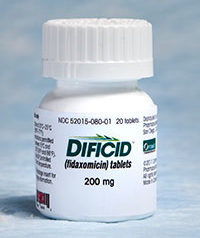
Fidaxomicin should be the antibiotic of choice when treating adults with Clostridioides difficile infection, according to new guidance from the Infectious Diseases Society of America and the Society for Healthcare Epidemiology of America.
Previous guidance recommended the use of either fidaxomicin or vancomycin for initial or recurrent cases. Vancomycin still may be used when fidaxomicin is not available, and the latter drug may be cost-prohibitive, the authors wrote.
Clinicians also are prompted to use the monoclonal antibody bezlotoxumab along with standard-of-care antibiotics for C. diff infections that recur within six months. Bezlotoxumab should not be used in people who have congestive heart failure unless the benefit outweighs the risk, according to a summary of the guidance from CIDRAP, the Center for Infectious Disease Research and Policy, University of Minnesota, MN.
The changes are based on an updated review of studies, and the two new recommendations are conditional, with a very low or moderate certainty of evidence, the authors noted.
The authors did not change the suggestion that patients who have multiple bouts of C. diff infection and don’t respond to antibiotics be prescribed fecal microbiota transplantation, or FMT. But the authors note that the Food and Drug Administration has issued three warnings regarding FMT since 2018 due to the potential for transmission of disease-causing bacteria and SARS-CoV-2, the virus that causes COVID-19, CIDRAP reported.
The guidance was published in the journal Clinical Infectious Diseases.




